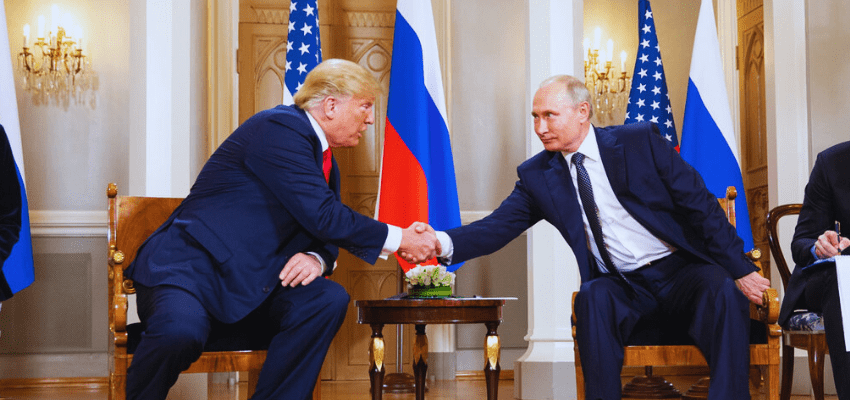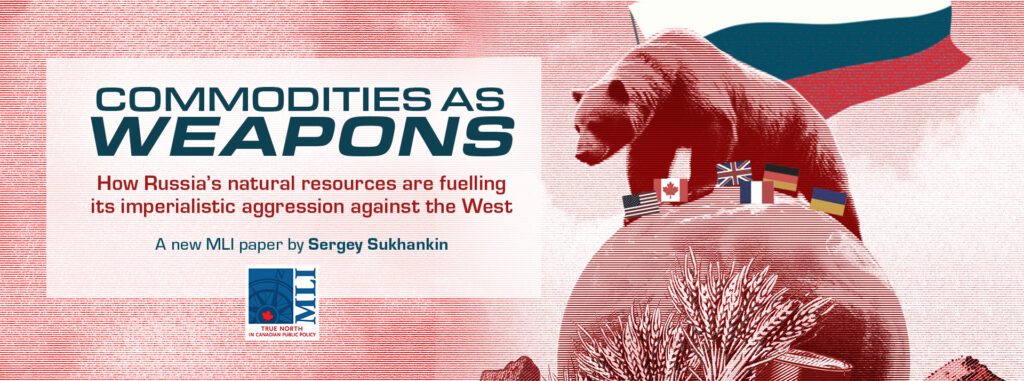This article originally appeared in the National Post.
By Marcus Kolga, March 3, 2025
The sound of champagne corks popping inside the Kremlin on Friday must have been deafening. From parroting Kremlin talking points to last week’s efforts by U.S. President Donald Trump to publicly humiliate Ukrainian President Volodymyr Zelenskyy, the Trump administration has been delivering one victory after another to Russian President Vladimir Putin — who, until early January, had been on the defensive.
Instead of showing solidarity with Ukraine, the U.S. president treated Zelenskyy with sneering disdain in the Oval Office, sending a clear message to Ukraine and America’s other allies that neither he nor his vice-president, JD Vance, can be trusted to defend them. Instead, they have chosen to exploit Ukraine’s suffering through mafia-style diplomacy, brazenly demanding control over US$500 billion (C$720 billion) worth of Ukrainian resources — an act that can only be described as extortion.
These developments are naturally fuelling growing concerns about the Kremlin’s unprecedented influence over U.S. foreign policy. In the past few chaotic weeks, Trump has openly regurgitated Russian disinformation about Ukraine, legitimized the Kremlin’s Orwellian distortion of the truth and shifted blame from the aggressor of a criminal invasion to its victim.
The impact of Russian disinformation on the Trump administration represents a historic victory for Russian influence operations, whose ultimate goal is to shape political decision-making in the West. It also signals the administration’s tacit approval of Putin’s totalitarian neo-imperialist policies — an alarming development for Canadians, whose sovereignty has also been challenged by Trump.
Trump and his administration appear to be operating within a world painted by the Kremlin’s relentless fire-hose of lies and propaganda. In that distorted world, Russia’s genocidal war against Ukraine is framed as a noble effort to purge the country of its “neo-Nazi dictator” and thwart Ukraine and NATO’s supposed imperial ambitions.
Over a few short weeks, Trump has amplified Putin’s propaganda, falsely claiming that Zelenskyy started the war. Trump has previously characterized Russia’s invasion as “genius,” but is now going further, labelling Zelenskyy as a dictator for not holding elections since the war began, while conveniently ignoring that Putin, who has been in power for 25 years, has systematically eliminated all independent media and violently repressed political dissent.
For Russia — a nuclear-armed middle power with an economy that’s smaller than Canada’s — this stunning propaganda victory represents the culmination of the Kremlin’s decades-long information war targeting western democracies, whose efforts to combat it have become shared targets of the Putin and Trump administrations.
At the Munich Security Conference, Vance criticized America’s allies for failing to uphold free speech rights in their fight against disinformation, yet his own government recently restricted press freedom by banning the Associated Press from the Oval Office for not using Trump’s preferred political terms, like calling the Gulf of Mexico the “Gulf of America.” This blatant hypocrisy mirrors authoritarian tactics used by leaders like Putin.
Trump has also surrounded himself with Kremlin-aligned figures such as Tulsi Gabbard, a long-time Putin apologist. Even more disturbingly, she now controls the U.S. intelligence apparatus.
Exiled Russian opposition leader and chess grandmaster Garry Kasparov told me that he believes Canadians need to be alert to emerging threats to their sovereignty: “Donald Trump’s threats to make Canada the 51st state echo Putin’s justifications for invading Ukraine — denying sovereignty and rewriting history to suit his ambitions. While Trump may not yet be ready to imitate Putin’s war-making, Canadians must not underestimate the threat behind the rhetoric.”
Trump’s threats about annexing Canada mirror Putin’s strategy in Ukraine: delegitimizing a nation’s sovereignty and using economic pressure as a weapon of control. The goal in both cases is clear: undermine democracy, destabilize regional security and intimidate free countries into submission. Canadians must take this threat seriously.
Meanwhile, Russia will continue intensifying its information and influence operations in Canada, aiming to undermine our democracy and interfere in our upcoming election. Alarmingly, Canada’s vigilance against these threats may have been weakened by the final report of the Foreign Interference Commission, which downplayed the Kremlin’s ongoing operations against our democracy, despite clear evidence of their existence.
Last September, the U.S. Department of Justice exposed a Russian intelligence plot, in which two Canadians were allegedly paid to establish a media platform pushing Kremlin-controlled narratives. The threat, as we have seen in the United States, is real, it’s growing and it requires brave, non-partisan leadership to confront it.
What is clear is that, in both the United States and Canada, there remains a dangerous impulse to appease authoritarian regimes and downplay the threat they pose to the democratic world. This shortsighted complacency has left us vulnerable to the growing existential geopolitical crisis we now face. Without resolute, non-partisan leadership and an unwavering commitment to confronting and disrupting these forces, we will lose. Worse yet, we may submit to them.
Marcus Kolga is a senior fellow at the Macdonald-Laurier Institute and founder of DisinfoWatch.org.







